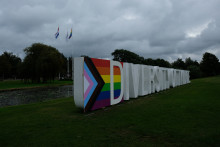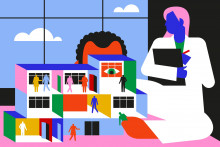In the final song on her new album All Of Us Flames, Ezra Furman asks: ‘What do your rainbows do here on the ground?’ As the UT celebrates its second Diversity Week this week, there is cause to ask: What does the colorful ‘Diversity of Twente’ lettering do outside of this one week in October? I worry that the Diversity Days are more of a branding exercise than a genuine attempt at making the UT a better place; an event designed to distract from what is not alright. I worry that as an institution, the UT prides itself on the presence of diversity under its roof while leaving it to individuals to fight for respect and recognition.
Diversity can refer to the presence of different communities within an institution, or it can refer to the goal of building an inclusive institution. Diversity has also become a corporate buzzword; often signalling an outward stance without a corresponding inward commitment. As an institution. The UT is an international university, but is it inclusive? In recent years, the UT has recruited many foreign students and staff, but frequently failed to offer adequate support in terms of housing, health care, and social security, or helping them make sense of the rules of a different academic culture.
When inclusion fails under these circumstances, the outcome is then blamed on the ways in which new colleagues and students (‘they’) are different from those who are established (‘us’). It is blamed on the ways ‘they’ don’t conform to White Dutch majority culture. The same attitude serves to mask racist dispositions: it makes it easy to mark ‘them’ as difficult, and ‘their’ cultures as alien or exotic. Administrative conventions are left implicit, and foreign students and staff are left alone in figuring them out. When they search for counselors or mentors, it is unlikely that they find someone who shares their experiences. The mere presence of diversity hardly leads to reflection on the majority culture that surrounds it. The standard answer still is: ‘This is simply how we do things here.’
Queer life on campus is largely invisible. I don’t just mean the visibility of queer staff or queer student groups. I mean the way in which queer topics feature (or don’t) in research and teaching, and the way in which the institution takes care (or not) to ensure it is not just safe to come out, but safe to exist on campus. The institution deadnames students on their diplomas (just as it routinely mangles ‘foreign’ names in its HR system). It insists on binary gendering (and the clunky ‘he or she’) as the norm in official communications (although one can now register as ‘other’ in the HR system). Parental leave schemes assume that there is a mother and a father, and the mother stays home, while the father spends just a few weeks with the newborn child. While both the Dutch legal framework and the UT’s leave policies became more generous this year, both still treat birth parents and their partners differently (and adoptions as different from births).
Two years ago, UT student, Anouk Nordeloos, detailed the difficulties she faces on campus as a wheelchair user. She described that, despite her many attempts to speak to those in power, nothing happened. During last year’s Diversity Days, the UN Declaration of Intent was signed with much fanfare. Have those intentions translated into actual changes on campus? In terms of physical mobility (getting around between and within buildings, finding accessible restrooms or kitchen facilities) there are few visible changes. In terms of neurodiverse staff and students, there is increased awareness, but it is unclear how that awareness will translate into action (e.g., availability of quiet spaces, different ways of conducting work meetings). The outdated standard of disability at the UT is that of ‘special needs’: someone who complicates matters through their very existence. Accommodations need to be requested and argued for, which is counter to models of inclusion that recommend proactive adjustments.
The UT is legally required to foster diversity through its hiring practices, but it is unclear how this goal will be implemented and enforced at faculty and section levels. The Diversity, Equity, and Inclusion Action Plan for 2022-2024 lists a number of issues that need to be addressed, but its practical aims rarely go beyond drafting yet more plans, writing yet more reports, or ‘looking at’ specific situations. This is not a criticism of those who are working hard for diversity: first and foremost, the D&I officer and her team, but also the employees and students who dedicated their time and energy to the SEG Inclusion over the past year. Their commitment is not in question. But if action plans contain very few actions, if recommendations and complaints are routinely ignored, it raises the question: Does the institution want to change, or does it just want to look busy thinking about change?
To be fair, the lack of real change may be due to the fact that diversity initiatives are relatively new at the UT, or it may be because these initiatives receive few resources. Irrespective of which group of ‘diverse’ students or staff you’re speaking to, one pattern keeps repeating: there are resources and staff for those who need support, but the resources are scarce and difficult to access, and staff are overwhelmed and overworked. Wait times for appointments with student psychologists and counselors can be prohibitive. Study advisors have to take care of hundreds, if not thousands of students. Depending on the problem and the expertise of the psychologist, counselor, or advisor, appointments might not yield more than generic advice. This is not a problem with the psychologists, counselors, and study advisors; again, their commitment is not in question. The problem that, as primary points of contact, these persons are tasked with shouldering ‘diversity work’ that should be addressed by structural changes. Raising awareness is important. But mere awareness is no reason to celebrate.







